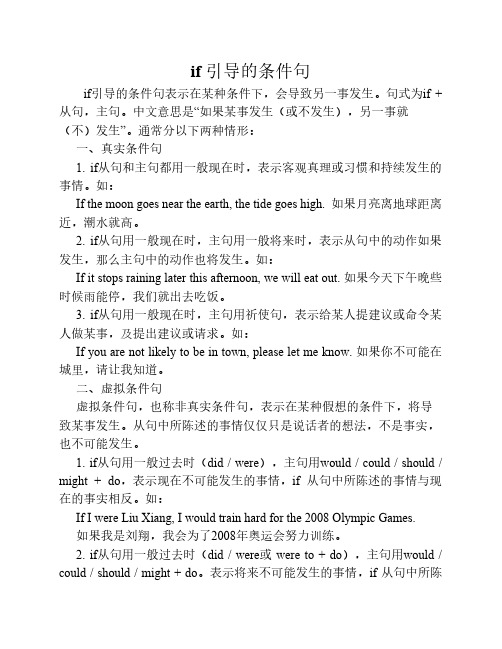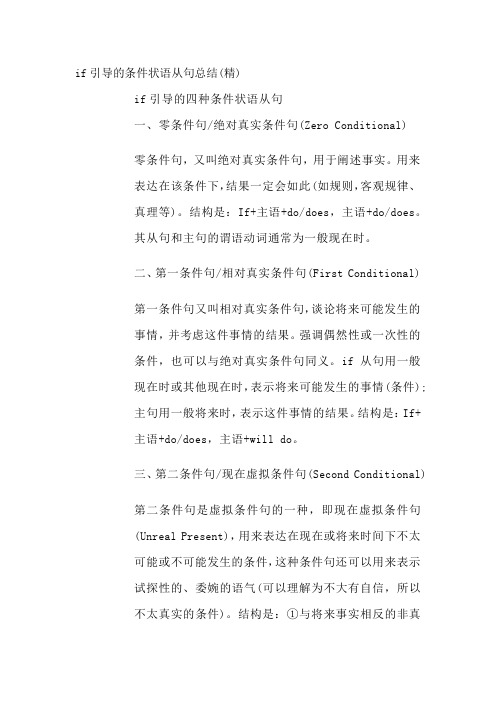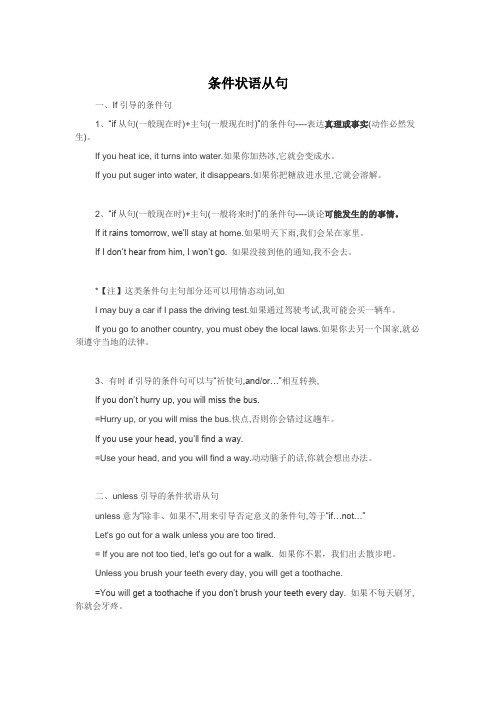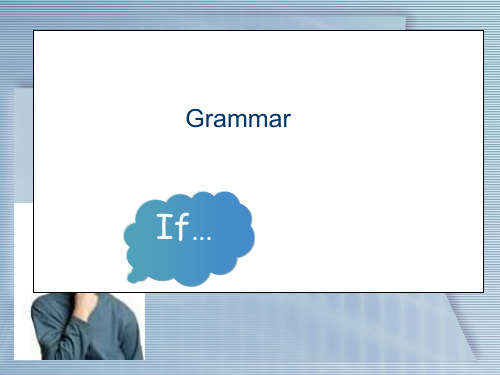if引导的一般条件句
if 引导的条件句

if 引导的条件句if引导的条件句表示在某种条件下,会导致另一事发生。
句式为if +从句,主句。
中文意思是“如果某事发生(或不发生),另一事就(不)发生”。
通常分以下两种情形:一、真实条件句1. if从句和主句都用一般现在时,表示客观真理或习惯和持续发生的事情。
如:If the moon goes near the earth, the tide goes high. 如果月亮离地球距离近,潮水就高。
2. if从句用一般现在时,主句用一般将来时,表示从句中的动作如果发生,那么主句中的动作也将发生。
如:If it stops raining later this afternoon, we will eat out. 如果今天下午晚些时候雨能停,我们就出去吃饭。
3. if从句用一般现在时,主句用祈使句,表示给某人提建议或命令某人做某事,及提出建议或请求。
如:If you are not likely to be in town, please let me know. 如果你不可能在城里,请让我知道。
二、虚拟条件句虚拟条件句,也称非真实条件句,表示在某种假想的条件下,将导致某事发生。
从句中所陈述的事情仅仅只是说话者的想法,不是事实,也不可能发生。
1. if从句用一般过去时(did / were),主句用would / could / should / might + do,表示现在不可能发生的事情,if 从句中所陈述的事情与现在的事实相反。
如:If I were Liu Xiang, I would train hard for the 2008 Olympic Games.如果我是刘翔,我会为了2008年奥运会努力训练。
2. if从句用一般过去时(did / were或 were to + do),主句用would / could / should / might + do。
表示将来不可能发生的事情,if 从句中所陈述的事情与将来的事实相反。
if引导的一般条件句.

If 引导的一般条件状语从句--------By the teacher: Jerry Zhang条件状语从句概念:在复合句中,由从句表示的状语叫做状语从句。
它可以用来修饰主语中的动词.形容词.副词等。
根据它表达的意思,状语从句可以分为时间状语从句,地点状语从句,条件状语从句,比较状语从句,目的状语从句,结果状语从句和让步状语从句等。
由连接词if或unless引导的状语从句叫做条件状语从句。
(注意:在含有条件状语从句的复合句中,如果主句是一般将来时态,从句要用一般现在时[主将从现原则]经典语句:If it doesn't rain tomorrow, we will go to the zoo. If you open the door,I will come in.if 引导的条件状语从句主句用一般将来时,if 从句用一般过去时。
We will go to the park if it is fine tomorrow.如果明天天好的话我们就去公园。
We will go traveling if we have time tomorrow.如果明天我们有时间我们就去旅行。
主句祈使句,if 从句用一般现在时。
Please call me if you need help. 如果你需要帮助请打电话给我。
Sing a song if you feel happy. 如果感到快乐就唱首歌吧!主句含有情态动词,if 从句用一般现在时。
You can make a lot of money if you run a company.如果你经营一家公司的话你会装很多钱。
You can get number one if you study hard. 如果你努力学习你就可以得第一。
—Mary, what about going boating if it doesn’t rain? 玛丽,如果明天不下雨,我们就划船好吗?—Good idea. 好主意。
If引导条件句的用法

If 引导条件句的用法1、真实条件句用于陈述语气,假设的情况可能发生,其中if 是如果的意思;时态关系句型:条件从句主句一般现在时shall/will + 动词原形If he comes, he will bring his violin.典型例题The volleyball match will be put off if it ___.A. will rainB. rainsC. rainedD. is rained答案B;真实条件句主句为将来时,从句用一般现在时;注意:1 在真实条件句中,主句不能用be going to表示将来,该用shall, will.错If you leave now, you are never going to regret it.对If you leave now, you will never regret it.2 表示真理时,主句谓语动词便不用shall will +动词原形,而直接用一般现在时的动词形式;2 非真实条件句1时态:可以表示过去,现在和将来的情况;它的基本特点是时态退后;a. 同现在事实相反的假设;句型:条件从句主句一般过去时should would +动词原形If they were here, they would help you.b. 表示于过去事实相反的假设;句型:条件从句主句过去完成时shouldwould have+ 过去分词If she had worked harder, she would have succeeded.The rice would not have been burnt if you had been more careful.If my lawyer had been here last Saturday, he would have prevented me from going.If he had come yesterday, I should / would have told him about it.含义:He did not come yesterday, so I did not tell him about it.If he had not been ill and missed many classes, he would have made greater progress.含义:He was ill and missed many lessons, so he did not make greater progress.c. 表示对将来的假想句型:条件从句主句一般过去时should+ 动词原形were+ 不定式would + 动词原形should+ 动词原形If you succeeded, everything would be all right.If you should succeed, everything would be all right.If you were to succeed, everything would be all right.3 混合条件句主句与从句的动作发生在不同的时间,这时主,从句谓语动词的虚拟语气形式因时间不同而不同,这叫做混合条件句;If you had asked him yesterday, you would know what to do now.从句与过去事实相反,主句与现在事实相反;If it had rained last night 过去, it would be very cold today 现在.4 虚拟条件句的倒装虚拟条件句的从句部分如果含有were, should, 或had, 可将if省略,再把were, should或had 移到从句句首,实行倒装;Were they here now, they could help us.=If they were here now, they could help us.Had you come earlier, you would have met him=If you had come earlier, you would have met him.Should it rain, the crops would be saved.=Were it to rain, the crops would be saved.注意:在虚拟语气的从句中,动词’be’的过去时态一律用"were",不用was,即在从句中be用were代替;If I were you, I would go to look for him.如果我是你,就会去找他;If he were here, everything would be all right.如果他在这儿,一切都会好的;典型例题_____ to do the work, I should do it some other day.A. If were IB. I wereC. Were ID. Was I答案C. 在虚拟条件状语中如果有were, should, had这三个词,通常将if省略,主语提前, 变成were, should, had +主语的形式;但要注意,在虚拟条件状语从句中,省略连词的倒装形式的句首不能用动词的缩略形式;如我们可说Were I not to do., 而不能说Weren’t I to do.5 特殊的虚拟语气词:should1 It is demanded / necessary / a pity + that…结构中的主语从句的谓语动词要用should 加动词原形, should 可省略;句型:1suggestedIt is 2important that…+ should do3 a pity1suggested, ordered, proposed, required, demanded, requested, insisted;+ should do2important, necessary, natural, strangea pity, a shame, no wonder3It is suggested that we should hold a meeting next week.It is necessary that he should come to our meeting tomorrow.2在宾语从句中的应用在表示命令、建议、要求等一类动词后面的从句中;order, suggest, propose, require, demand, request, insist, command, insist + should doI suggest that we should hold a meeting next week.He insisted that he should be sent there.注意:如suggest, insist不表示"建议" 或"坚持要某人做某事时",即它们用于其本意"暗示、表明"、"坚持认为"时,宾语从句用陈述语气;The guard at gate insisted that everybody obey the rules.判断改错:错You pale face suggests that you should be ill.对Your pale face suggests that you are ill.错I insisted that you should be wrong.对I insisted that you were wrong.3在表语从句,同位语从句中的应用在suggestion, proposal, idea, plan, order, advice等名词后面的表语从句、同位语从句中要用虚拟语气,即should+动词原形;My idea is that we should get more people to attend the conference.I make a proposal that we should hold a meeting next week.。
if引导的条件状语从句总结(精)

if引导的条件状语从句总结(精)if引导的四种条件状语从句一、零条件句/绝对真实条件句(Zero Conditional)零条件句,又叫绝对真实条件句,用于阐述事实。
用来表达在该条件下,结果一定会如此(如规则,客观规律、真理等)。
结构是:If+主语+do/does,主语+do/does。
其从句和主句的谓语动词通常为一般现在时。
二、第一条件句/相对真实条件句(First Conditional)第一条件句又叫相对真实条件句,谈论将来可能发生的事情,并考虑这件事情的结果。
强调偶然性或一次性的条件,也可以与绝对真实条件句同义。
if从句用一般现在时或其他现在时,表示将来可能发生的事情(条件);主句用一般将来时,表示这件事情的结果。
结构是:If+主语+do/does,主语+will do。
三、第二条件句/现在虚拟条件句(Second Conditional)第二条件句是虚拟条件句的一种,即现在虚拟条件句(Unreal Present),用来表达在现在或将来时间下不太可能或不可能发生的条件,这种条件句还可以用来表示试探性的、委婉的语气(可以理解为不大有自信,所以不太真实的条件)。
结构是:①与将来事实相反的非真实条件句是If+主语+should do/were to do/did,主语+would/should/could/might do;②与现在事实相反的非真实条件句是If+主语+did,主语+would/should/could/might+do。
四、第三条件句/过去虚拟条件句(Third Conditional) 第三条件句是表示与过去事实相反的虚拟语气,是用来表达如果(If)当时那样发生,另外一方面(当时)结果会如何。
通常是指过去的事情,带有一切已经太迟而不能够补救的意思。
结构是:If+主语+had done,主语+would/should/could/ might+have done。
if 条件句的时态搭配1.if从句用一般现在时,主句用一般将来时2.if从句用一般现在时,主句用may/might/canIf the fog gets thicker the plane may/might be diverted.3.if从句用一般现在时,主句用must/shouldIf you want to lose weight you must/should eat less bread.4.if从句用一般现在时,主句用一般现在时5.if从句用现在进行时,主句用一般将来时6.if从句用现在完成时,主句用一般将来时If you have finished dinner I’ll ask the waiter for the bill.。
条件状语从句

条件状语从句一、If引导的条件句1、“if从句(一般现在时)+主句(一般现在时)”的条件句----表达真理或事实(动作必然发生)。
If you heat ice, it turns into water.如果你加热冰,它就会变成水。
If you put suger into water, it disappears.如果你把糖放进水里,它就会溶解。
2、“if从句(一般现在时)+主句(一般将来时)”的条件句----谈论可能发生的的事情。
If it rains tomorrow, we’ll stay at home.如果明天下雨,我们会呆在家里。
If I don’t hear from him, I won’t go. 如果没接到他的通知,我不会去。
*【注】这类条件句主句部分还可以用情态动词,如I may buy a car if I pass the driving test.如果通过驾驶考试,我可能会买一辆车。
If you go to another country, you must obey the local laws.如果你去另一个国家,就必须遵守当地的法律。
3、有时if引导的条件句可以与“祈使句,and/or…”相互转换,If you don’t hurry up, you will miss the bus.=Hurry up, or you will miss the bus.快点,否则你会错过这趟车。
If you use your head, you’ll find a way.=Use your head, and you will find a way.动动脑子的话,你就会想出办法。
二、unless引导的条件状语从句unless意为“除非、如果不”,用来引导否定意义的条件句,等于“if…not…”Let's go out for a walk unless you are too tired.= If you are not too tied, let's go out for a walk. 如果你不累,我们出去散步吧。
if引导的条件句

tired
A:What will you do if you are tired? B: I will… if I am tired.
go to bed/have a rest/listen to music...
Discuss with your partner:
What will you do if you have a lot of money one day?
What’s the rule? (3)
if条件状语从句中,如果主句 是祈使句,从句用一般现在时。
•Let me know if he comes. •Don’t wait for me if I am late. •Put up your hands if you have any questions.
What’s the rule? (2)
if条件状语从句中,如果主句 有must,can,may等情态动 词,从句用一般现在时。
•You must stop if the traffic light is red. •You may go fishing if you are free.
•He can go home if he finishes his homework.
Find the rule (2)
I will take part in the English competition.
Find the rule (2)
Dad will buy a pen for me.
Dad will buy a pen for me. I will take part in the English competition.
What’s the rule? (1)
用if引导的条件状语从句15个

用if引导的条件状语从句15个如果引导的条件状语从句是英语语法中非常常见的句型,用于表达某种条件下发生的情况。
下面将介绍15个以if引导的条件状语从句的相关内容。
1. **Zero Conditional**Zero conditional用于表达普遍真理或习惯性的动作,结构为if + 现在时,现在时。
例如:If you heat water to 100 degrees, it boils.2. **First Conditional**First conditional用于表达将来可能发生的事情,结构为if + 现在时,将来时。
例如:If it rains tomorrow, we will stay indoors.3. **Second Conditional**Second conditional用于表达与现在事实相反的假设,结构为if + 过去时,would/could/might + 原形动词。
例如:If I were rich, I would travel around the world.4. **Third Conditional**Third conditional用于表达与过去事实相反的假设,结构为if + 过去完成时,would/could/might + have + 过去分词。
例如:If I had studied harder, I would have passed the exam.5. **Mixed Conditional**Mixed conditional结合了第二和第三条件句的结构,用于表达过去的假设对现在的影响,或现在的假设对过去的影响。
例如:If I had known you were coming, I would have baked a cake.6. **Unless**Unless的意思是“除非”,引导的条件状语从句表示否定条件。
结构为unless + 句子,相当于if not。
if引导的条件句三种情况

1•对现在虚拟:条件句:一般过去时主句:could/would/+动词原形。
2•对过去虚拟:条件句:过去完成时主句:could/would have done0 3•对将来虚拟:条件句:l.were to do ;2.should do ; 3•—般过去时:主句could/would/+动词原形。
—、对现在情况的虚拟条件从句中谓语动词用一般过去式,主句用,f would/should/might/could+动词原形”形式,表示对现在不可能实现情况的假想。
If I were you,I would choose to work in a small town.如果我是你f我会选择在小城镇工作。
(事实上我不是你)If I had a map now,we could easily get out of the forest.如果现在有地图,我们能很容易地走出森林。
(事实上是现在没有地图)注意:在条件从句中,如果谓语动词是be的形式,不管主语是单数还是复数,书面语中用we©而口语中如果是单数,也可以用was,不过在if I were…中一般用were.If the world were perfect,how could we enjoy the pleasure and comfort of being successful?世界若完美,我们如何能尝到创造成功的快慰?二、对过去情况的虚拟条件从句中谓语动词用过去完成式,主语用,/would/could/should/might+have+动词的过去分词"形式。
If it had not been for your help yesterday^ could not have caught the bus.如]果昨天没有你的帮助,我不会赶上公交车。
(事实是你昨天已经帮助了我,所以我赶上了车)三、对将来情况的虚拟在表示与将来事实相反的条件从句中,谓语动词可用should do,were to do或动词的过去式三种形式表示,但意义略有不同。
- 1、下载文档前请自行甄别文档内容的完整性,平台不提供额外的编辑、内容补充、找答案等附加服务。
- 2、"仅部分预览"的文档,不可在线预览部分如存在完整性等问题,可反馈申请退款(可完整预览的文档不适用该条件!)。
- 3、如文档侵犯您的权益,请联系客服反馈,我们会尽快为您处理(人工客服工作时间:9:00-18:30)。
If 引导的一般条件状语从句条件状语从句概念:在复合句中,由从句表示的状语叫做状语从句。
它可以用来修饰主语中的动词.形容词.副词等。
根据它表达的意思,状语从句可以分为时间状语从句,地点状语从句,条件状语从句,比较状语从句,目的状语从句,结果状语从句和让步状语从句等。
由连接词if或unless引导的状语从句叫做条件状语从句。
(注意:在含有条件状语从句的复合句中,如果主句是一般将来时态,从句要用一般现在时[主将从现原则])经典语句:If it doesn't rain tomorrow, we will go to the zoo. If you open the door,I will come in.if 引导的条件状语从句主句用一般将来时,if 从句用一般现在时。
We will go to the park if it is fine tomorrow.如果明天天好的话我们就去公园。
We will go traveling if we have time tomorrow.如果明天我们有时间我们就去旅行。
主句祈使句,if 从句用一般现在时。
Please call me if you need help. 如果你需要帮助请打电话给我。
Sing a song if you feel happy. 如果感到快乐就唱首歌吧!主句含有情态动词,if 从句用一般现在时。
Y ou can make a lot of money if you run a company.如果你经营一家公司的话你会装很多钱。
Y ou can get number one if you study hard. 如果你努力学习你就可以得第一。
—Mary, what about going boating if it doesn’t rain? 玛丽,如果明天不下雨,我们就划船好吗?—Good idea. 好主意。
1、主将从现:主语将来时,从句一般现在时,例:If it is rainy tomorrow,(从句)I will stay at home。
(主句)2、虚拟:主句用would do,从句用过去式,具有假设性,一定不会是真的,例如“如果我是你,我不会穿那条裤子”If I were you,I would not wear the pants。
我永远都不可能是你,所以是具有假设性的,还有“如果你有一百万,你会怎么做?”突然天降横财机率是很小的,所以也是具有假设性的,像这种几乎不可能发生的事或者根本不会发生的事就用虚拟!条件状语从句和主句还有一个共同的伙伴,有时它可以替代从句和主句,它就是“祈使句+and / or+简单句”。
其中and表示句意顺承;or则表示转折,意为“否则”。
例如:If you work harder, you’ll pass the exam.= Work harder, and you’ll pass the exam. 如果你再努力些,你就会通过考试。
If you don’t hurry up, you’ll miss the train.= Hurry up, or you’ll miss the train. 如果你不快点儿,你就赶不上火车了。
在学习条件状语从句时,同学们要注意以下几点:一、时态如果主句是一般将来时态,这时从句不可以用将来时态,而要用一般现在时。
例如:I won’t go there with you if it rains tomorrow. 如果明天下雨的话,我就不和你一起去那儿了。
二、主从句的位置大多数情况下,从句可以位于主句之前,也可以位于主句之后。
不过从句在前时,主从句之间必须用逗号隔开。
例如:Please tell me if he comes back.= If he comes back, please tell me. 如果他回来了,请告诉我一声。
词的适当形式填空1. If you wear jeans, we ____________ (not let) you in.2. If you go to the party, you ______________ (have) a great time.3. If he ___________ (come) tomorrow, I ____________(call).4. What _______ you _______ (do) if you ________ (be ) A teacher?5. Look at the clouds. It _________ (rain).6. Kate usually __________ (watch) TV on Sundays.7. Listen! Who ___________ (sing) in the next room?8. They ___________ (get) to Shanghai two days ago.9. If it __________ (be) fine next Sunday, we _________ (help) the farmers pick apples.10. How soon ________ you ________ (finish) the work?11. Let me ________(tell) you _______ (say) it like this.12. Don’t make any noise. The baby ________- (sleep) now.13. It _________ (take) me half an hour __________(learn) this text by myself yesterday.14. He with his friend ________ (go) to help Grandma Li three times a week.15. My mother is watering these _____________ (flower).16. If you _________(stay) at home tomorrow, you’ll see him.17. If you drive to Shanghai next week, your parents______________(be ) angry.18. If he ___________(ride) his bike to go to school tomorrow, he will be late.19. If it ____________ (not rain) tomorrow, we will meet you.20. If you ____________ (not help) me, I won’t let you come in.21. Do you know what _________-(happen) in ten years.22. There __________ (be) a speech by our headmaster tomorrow afternoon in our school.根据括号内的要求,改写下列各句,每空一词。
1. I’ll go to your birthday party if I’m free.(对划线部分提问)_______ will you ________ if you are free?2. They’ll ask you some questions.(一般疑问句)_______ they ask you ________ questions?3. If I’m a teacher, ___________________________(完成句子)4. If he doesn’t help me, I won’t buy the car,(改为简单句)I won’t buy the car___________ __________ help.翻译下列句子1.如果我明天有时间,我就和你一起玩。
If I ___ ____ tomorrow, I _____ _____ with you.2.今天晚上如果有足球赛,他们就不上学了。
If there ___ a football match, they _____________to school.3.如果明天不下雨,我们就去公园。
If it _____ ____ tomorrow, we _____ ___ to the park.1.If you _____ to the party, you’ll have a great time. A. will go B. went C. go D. going2.I ____ her the answer if she ____me.A. can tell, will askB. will tell, will askC. would tell, askD. will tell, asks3. – What are you going to do tomorrow?--We’ll go to the library tomorrow if it ___.A. isn’t rainB. rainC. won’t rainD. doesn’t rain4.—Do you know when he will come back tomorrow?--Sorry, I don’t know. When he ____ back, I’ll tell you.A. comesB. will comeC. comeD. may come5. What will you do if you _____ to the old folk’s home visit?A. goB. wentC.goingD. will go6. If I eat ____ food, I’ll be very fat.A. too manyB. many tooC. too muchD. much too7. I’ll give the book to him if he ___ here next Sunday.A. will comeB. comesC. is comingD. came8. There ____an English film in our school tomorrow.A. is going to haveB. will haveC. is going to beD. has9. Could you tell us where ____?A. will the next Olympic Games heldB. the next Olympic Games will be heldC. would the next Olympic Games be heldD. the next Olympic Games would be held10. When my mother returned last night, I ____ a book.A. readB. am readingC. was readingD. am going to read11.What ____ you ____ when it began to rain?A. do, doB. were, doingC. are, doingD. did, do12. I’ll wake you up when he ____back.A. willB. is going to comeC. comesD. come二、用所给词的适当形式填空1.If you ______(feel) tired, you _____ (have) to have a rest.2. Where _____ he ____(see) the film if he _______(have) time?3. If there ____(be) fewer trees, there ____( be) more pollution.4. He ___(dress) more casually if he ___( not work) on weekends.5. If Marcia ______(live) alone, she _______( keep) a pet parrot.6. Lana ___(buy)a new dress if the old one ___(be) out of style.7.The twins ______(fight) if they_____(argue).8. I ____(have) a bake sale if I ____(need) money for education.9. Peter ____( send) me a beautiful souvenir if he ____(tour) Spain.10. If Mr Green _______ (say) I am hard- working, my parents ___( feel) glad.11.I ______(go) to the beach if it______( not rain) this week.12. _____they ___( have) a match if the P.E. teacher __(be) busy?13.He ____(write) a letter to his grandparents if he ____(get) his report card this week.14. If she ____(get) up late, she ____( not catch) the early bus.15. Peter ____(major) in English if he ____(pass) the exams in Peking University.III完成句子1.如果他到的晚了会发生什么事情?What _______________ if he _____________ late?2. 如果努力学习,你就会取得好成绩。
